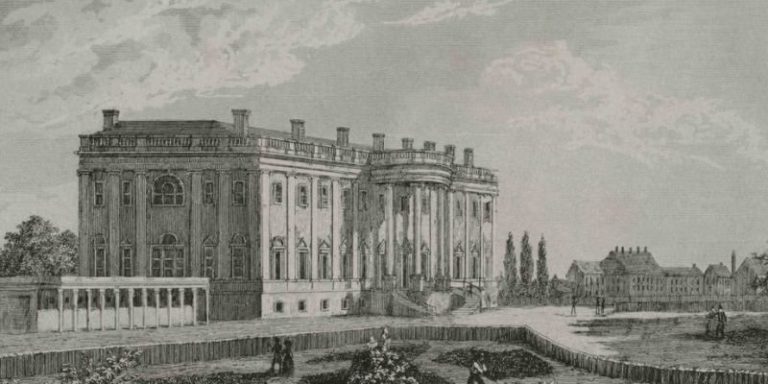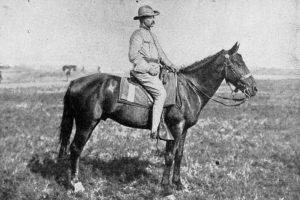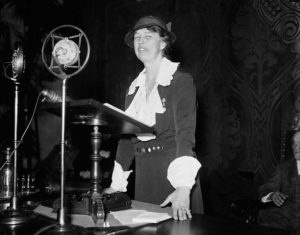This Week in History: October 9-15
Construction on the White House begins.
By: Kelli Ballard | October 9, 2022 | 1108 Words

(Photo by: Prisma/Universal Images Group via Getty Images)
“The game of history is usually played by the best and the worst over the heads of the majority in the middle.” ~ Eric Hoffer
October 13, 1792: Construction of the White House
Washington, DC, was not always the capital of the US. In the early days, as America fought for its freedom from England, Philadelphia was the main city for political gatherings and planning. Once the United States had its first president, it was time to designate an official capital and build a presidential building. On this day, construction began on what would later become known as the White House.
The first order of business was to find the location where the Executive Mansion, as it was called then, would be built. Maryland and Virginia gave land around the Potomac River so the District of Columbia could be formed. The district was designed to be the headquarters of the federal government.
On January 24, 1791, President George Washington issued a proclamation to announce the new capital’s location, and then work to build DC began. Although there were many proposals submitted for the design of the White House, including one from Thomas Jefferson, the winning bid was awarded to James Hoban, an Irish immigrant.
On November 1, 1800, President John Adams and his wife Abigail were the first to move into the new Executive Mansion, which was not yet completed. Nearby buildings were built with red brick, so when the new mansion was constructed with white-gray sandstone, it was quite a contrast and this is what led to it being referred to as the White House.
During the War of 1812, the British invaded and burned down part of the White House. The building wasn’t occupied again until 1817, when President James Monroe moved in. While the presidential home has gone through many upgrades, additions, and changes, it has forever remained a symbol of freedom for Americans. In a letter to his wife, Adams wrote, “I pray Heaven to bestow the best of Blessings on this House and all that shall hereafter inhabit it. May none but honest and wise men ever rule under this roof.”
Other Notable History Mentions
October 9, 1962: After almost 70 years of British rule, Uganda gained its independence.
October 9, 1970: Cambodia abolished its monarchy and declared itself the Khmer Republic. Founded during the Cambodian Civil War, the republic only lasted five years before it fell to the communist Khmer Rouge.
October 10, 1954: After French troops withdrew from Vietnam according to an armistice agreement, Ho Chi Minh’s communist forces went to Hanoi and took over the government of North Vietnam.
 October 10, 1973: Vice President Spiro T. Agnew resigned after charges were made that he had committed tax evasion while serving as a government official.
October 10, 1973: Vice President Spiro T. Agnew resigned after charges were made that he had committed tax evasion while serving as a government official.
October 11, 1899: The Second Boer War began in South Africa, with the Boers of the Transvaal and Orange Free State (Dutch-speaking settlers) fighting against the British Empire.
October 11, 1939: Albert Einstein warned President Franklin D. Roosevelt that Nazi Germany might be building an atomic bomb and that the US should work on developing its own. This led to the top-secret “Manhattan Project.”
October 11, 1976: After the death of communist leader Mao Zedong in China, the “Gang of Four” was blamed for being “counter-revolutionary forces.” The group, which included Mao’s widow, was arrested in the struggle for power once the leader died.
October 12, 1492: Christopher Columbus landed for the first time in the New World. He reached the Bahamas and named it “El Salvador” for the Spanish Crown.
October 12, 1811: Paraguay gained its independence from Argentina and Spain.
October 12, 1822: Brazil declared independence from Portugal.
October 13, 54 AD: The Empress Agrippina is rumored to have killed her husband, Roman Emperor Claudius, with poisoned mushrooms. His grand-nephew Nero took over and gained a reputation for being one of Rome’s most tyrannical emperors.
October 13, 1775: After the Second Continental Congress approved the idea to get a fleet of ships, the United States Navy was developed.
October 13, 1884: Universal time was established by Greenwich. This is how standard times worldwide are calculated.

Theodore Roosevelt (Photo by Smith Collection/Gado/Getty Images)
October 13, 1943: After fascist dictator Benito Mussolini was defeated and his government fallen, Italy declared war on Germany.
October 14, 1066: William of Normandy’s troops defeated King Harold II of England during the Battle of Hastings, which started the Norman Conquest in Britain.
October 14, 1912: An assassination attempt on President Theodore Roosevelt failed because the bullet could not pass through the thick coat and a glasses case the president wore.
October 14, 1947: Chuck Yeager, a US Air Force captain, became the first man to break the sound barrier. He flew a rocket-powered research aircraft.
October 14, 1964: Martin Luther King, Jr. became the youngest person to receive the Nobel Peace Prize, at 35 years old. His record was later broken, with the youngest recipient now being Malala Yousafzai, who won the prize at age 17.
October 15, 1815: After being defeated at the Battle of Waterloo, Napoleon Bonaparte started his exile on the Island of St. Helena.
October 15, 1991: Clarence Thomas was placed on the Supreme Court, becoming the second black man to join it.
Famous Birthdays
John Lennon (October 9, 1940) was born in Liverpool, England. A member of the band The Beatles, he was very popular around the world. He was assassinated on December 8, 1980, in New York City.

Eleanor Roosevelt (Photo by: Universal History Archive/Universal Images Group via Getty Images)
Giuseppe Verdi (October 10, 1813) was born in Le Roncole, Italy. An opera composer, some of his best works include La Traviata, Aida, and Rigoletto.
Eleanor Roosevelt (October 11, 1884) was born in New York City. Called the “First Lady of the World,” she was the wife of the 32nd president, Franklin Delano Roosevelt.
Ralph Vaughan Williams (October 12, 1872) was born in Down Ampney, Gloucestershire, England. A music composer and conductor, some of his most famous works include Mass in G Minor and The Pilgrim’s Progress.
Molly Pitcher (October 13, 1754) was born near Trenton, New Jersey, as Mary Ludwig. During the American Revolution, she took the place of her husband John Hays, who had collapsed, to run the cannon during battle.
William Penn (October 14, 1644) was born in London. King Charles II gave him a royal charter with land in America. He settled more than 50,000 square miles with members of all religious faith and is the founder of Pennsylvania.
Dwight D. Eisenhower (October 14, 1890) was born in Denison, Texas. The 34th president, he served two terms and had the nickname “Ike.”
Lee Iacocca (October 15, 1924) was born Lido Anthony Iacocca in Allentown, Pennsylvania. Known as “America’s first corporate folk hero,” he became an executive at Ford and helped Chrysler prevent bankruptcy.
















